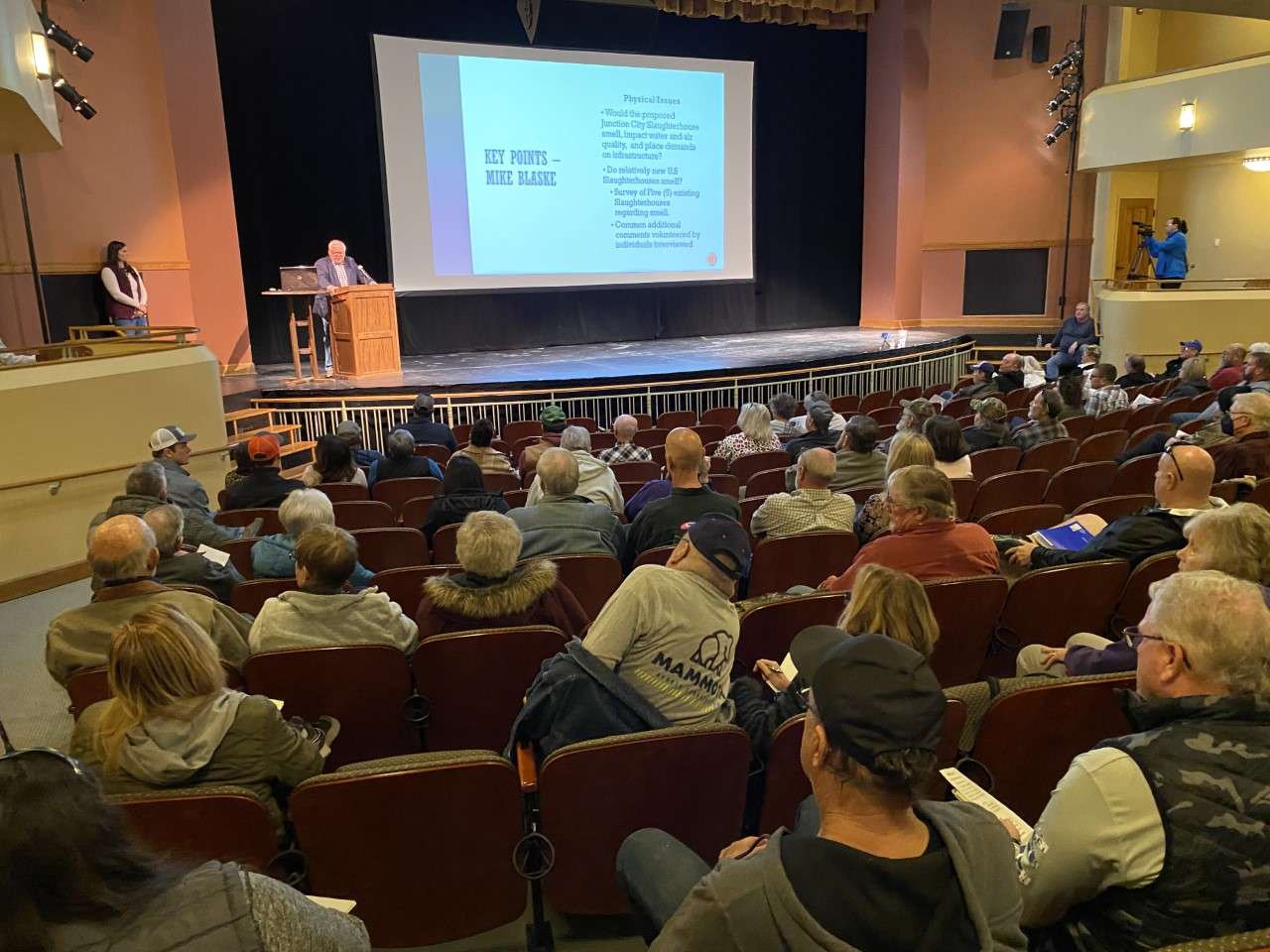
The question of what a live-kill beef processing plant would mean for Geary County was explored during a public meeting on Saturday at the C. L. Hoover Opera House. It was hosted by Concerned Citizens for Sensible Economic Development With Open Communications, who are opposed to the project. There was a sizable turnout for the event where expert speakers who have done research on the topic spoke, and the public was allowed to ask questions and offer their input.
Here are some of the facts presented for the proposed plant following research by retired architect Mike Blaske.
--There would be 300 employees.
--1,000 head of cattle per day would be killed
--160 million gallons of water would be needed per year.
--10 thousand-300 gallons of blood would have to be disposed of each day.
--There would be large scale truck traffic with each truck holding about 40 head of cattle.
--Bones and animal waste would have to be disposed of as well.
--Water and air pollution could occur.
--This would not be considered a particularly large plant.
A keynote speaker, Don Stull, referred to the Foote Cattle Company as the entity considering this project. There have not been any final decisions made on proceeding with it.
Blaske said, "I think that this is something that needs an awful lot of thought before a facility of this kind is brought in to our community."
Blaske said there have been attempts to ask the question how would this facility desal with the issues listed and the only answer received is that there is new technology. Whether it works or is in place anywhere at a slaughter plant where it could be checked was not available.
Blaske noted that the concerned citizens group are a little bit frustrated that they have not been getting open communication. There are nondisclosure agreements that have been signed by local leaders prohibiting them from talking about the project. Blaske called for better information. He also commented that he didn't understand putting a packing plant in the middle of westward growth in Junction City. The proposed location is just north of I-70 and would be on the southwest edge of the city.
On the subject of odor, Blaske contacted five slaughterhouses and businesses in their communities where he gathered opinions on the smell of a facility both pro and con, ranging from odors to the need for jobs. There was information volunteered that local townspeople are no longer the workforce of these slaughterhouses. The hourly wage was pretty good and the interior of slaughter houses were not pretty. There was huge turnover of employees the first two or three years. He also noted that he learned slaughterhouses are not good neighbors and should not be located in or near a city, and instead belong in isolated locations away from a town. New workers were also transient non-English speaking people, in a lot of instances it led to crime, and is an issue for hospitals because when they treat the workers the hospitals do not get reimbursed.
Retired KU anthropology professor Don Stull, has done research on the meat and poultry industry in multiple communities in three states and Canada. "In most cases the choice to bring in a packing plant was made by state and local officials before the general public even knew their town was under consideration. The people of Junction City are fortunate to be able to consider the consequences of the proposed meat plant and express their views before the final decision is made."
Stull noted that meat and poultry companies deliver jobs. "But many places pursue economic development without considering the larger issues of community development. They equate development with jobs and see economic development as the sole means for community maintenance and improvement. " Stull added unless economic development results in improved quality of life it can be detrimental. "Jobs like lunches are rarely free."
Stull said work on the line in a packing house is physically demanding, is dangerous, you do not need to speak English, have a high school diploma or have previous work experience to work on a packing house floor. "This helps explain why the meat and poultry industry relies heavily on immigrants and refugees." He added that low wages and disagreeable working conditions encourage employee turnover, there are greater demands on roads and highways, and this plant would be much smaller than others, for example, in Dodge City or Garden City.
Stull noted, "There are many things the citizens and leaders of Junction City need to know before they can make an informed decision about whether to support or oppose the proposed packing plant." Information is needed on topics ranging from potential labor sources, wages, support the company will provide to the community, tax abatements and other concessions the company may ask from Junction City and Geary County.
Questions from the public ranged from opposition to low wages to a desire for city and county leaders to consider the quality of life issues and be more transparent with the community. There was one observation about the negativity, noting that a lot of things were slanted. There was a positive reference to OSHA that 97% of meat packing plants are insured, they have 401K's, and language classes.
One comment referred to Junction City not being a friendly place for larger businesses or corporations to locate. Another was that everyone should do their homework and bring the proposal to a vote. It was asked how would the city take care of water and waste disposal needs. There was also an observation that in general property values go down the closer you are to a slaughterhouse or feed yard.
There were petitions in the lobby of the Opera House and yard signs available for distribution to those opposed to the project. Approximately 200 people attended the meeting.



